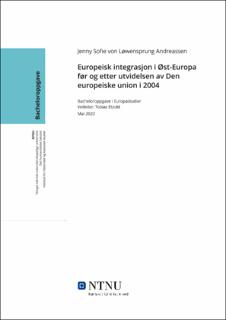| dc.contributor.advisor | Etzold, Tobias | |
| dc.contributor.author | Andreassen, Jenny Sofie von Løwensprung | |
| dc.date.accessioned | 2022-06-29T17:20:09Z | |
| dc.date.available | 2022-06-29T17:20:09Z | |
| dc.date.issued | 2022 | |
| dc.identifier | no.ntnu:inspera:110337431:46762911 | |
| dc.identifier.uri | https://hdl.handle.net/11250/3001619 | |
| dc.description.abstract | Denne oppgaven tar for seg Den europeiske unionens (EU) utvidelser til Øst-Europa i 2004, og de geopolitiske forandringene i forkant som ledet opp til dette, med mål om å studere den europeiske integrasjonen i Øst-Europa i dag. Oppgaven skal besvare spørsmålet hvilke viktige hendelser førte til EUs øst-utvidelse i 2004, og hvilke konsekvenser har denne hatt for økonomisk, politisk og sosial integrasjon i Øst-Europa? Oppgaven har en kronologisk oppbygning, som starter med empirisk bakgrunn om geopolitiske forandringer i Europa fra slutten av den kalde krigen i 1989, som var grobunnen for de østlige utvidelsene. I tillegg tar den for seg politiske hendelser i både EU og de øst-europeiske landene, der Visegrad-gruppen er fokuset (Polen, Tsjekkia, Ungarn og Slovakia). En stor del av oppgaven vil også omhandle europeisk integrasjon og identitet, der det vil være en diskusjon om hvem i EU som er ‘europeiske nok’, med tanke på politisk og sosial integrasjon i EU. Hovedfokuset er altså økonomisk og politisk integrasjon og utvikling i Visegrad-gruppen etter tilslutningene til EU i 2004. Oppgaven har et induktivt og kvalitativt forskningsdesign, der den ut fra empiri og teori skal studere og besvare aspektene ved forskningsspørsmålet. Dette vil bli sett på i lys av integrasjonsteori og europeisk identitetspolitikk. Basert på funnene i oppgaven er det tydelig at de østlige landene har hatt gode økonomiske utviklinger som følge av samarbeid og avtaler med EU, uten at man helt sikkert kan påstå at EU-medlemskap er grunnen til dette. Det viser seg derimot at den politiske og sosiale integrasjonen har gått andre veien, med en oppblomstring av høyreekstremisme, immigrantfobi og fremmedfrykt i flere øst-europeiske land, der særlig Polen og Ungarn stiller seg skeptiske til EU og dens politikk. | |
| dc.description.abstract | This thesis addresses the European Union (EU) expansions to Eastern Europe in 2004, and the geopolitical changes that preceded this, with the aim of studying European integration in Eastern Europe today. The thesis will answer the question what important events led to the EU’s Eastern enlargements in 2004, and what consequences has this had for economic, political and social integration in Eastern Europe? The thesis has a chronological structure, starting with an empirical background on geopolitical changes in Europe from the end of the Cold War in 1989, which was the breeding ground for the Eastern expansions. It will also address political events in both the EU and the Eastern European countries, with the Visegrad group as main focus (Poland, the Czech Republic, Hungary and Slovakia). A large part of the thesis will also revolve around European integration and identity, where there will be a discussion about who in the EU is ‘European enough’, in regard to political and social integration in the EU. The main focus will thus be economic and political integration and development in the Visegrad group after joining the EU. The thesis has an inductive and qualitative research design, where it will study and answer the research question, based on empirical and theoretical data. This will be seen in lights of integration theory and European identity policy. Based on the findings in the thesis, it is clear that the eastern countries have had good economic developments as a result of cooperation and agreements with the EU, without it being possible to say with absolute certainty that this is because of EU membership specifically. However, one can see that the political and social integration has gone the other way, with a flourishing of right-wing extremism, immigrant phobia and xenophobia in several Eastern European countries, where Poland and Hungary in particular are skeptical of the EU and its policies. | |
| dc.language | nob | |
| dc.publisher | NTNU | |
| dc.title | Europeisk integrasjon i Øst-Europa før og etter utvidelsen av Den europeiske union i 2004 | |
| dc.type | Bachelor thesis | |
